Meet the Frontline Club Awards 2013 shortlist: Broadcast
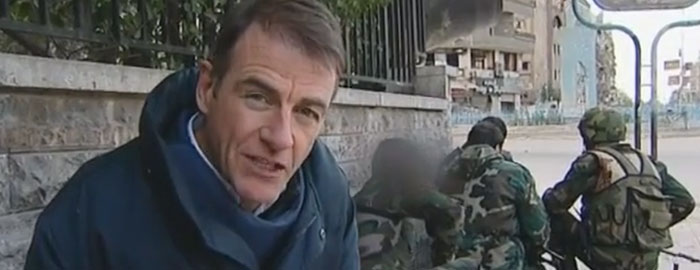
International editor Bill Neely joined ITV News in 1989 and has since covered almost every major international news event. He won three consecutive BAFTAs in a row for his coverage of the 2008 China Earthquake, the Haitian earthquake in 2010 and the Cumbria murders in 2011.
Neely and his team escaped the watch of their government minders to report on this terrifying scene for ITV News at Ten. He later wrote a piece about what he witnessed for The Sunday Telegraph.
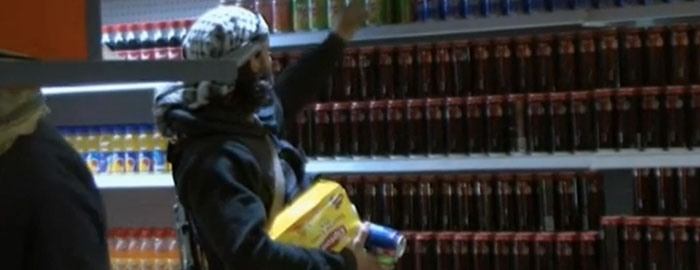
Of nominating the piece, Channel 4 News said:
“The focus of this extraordinary footage is Ibrahim al-Mazwagi, a 21 year old university graduate from London who died in February this year, fighting alongside a hardline Sunni militia called the Katiba al-Muhajireen (Battalion of Migrants). A member of the hardline Sunni militia Katiba al Muhajireen (the battalion of migrants), in the film Ibrahim al Mazwagi can be seen shooting weapons, going shopping for cereal with an AK over his shoulder and joining a key battle for a Syrian Army base called Sheik Suleiman in Western Aleppo. The astonishing footage also shows Mazwagi preparing to marry a Muslim woman from Sweden and goes to choose a sheep for slaughter for his wedding banquet. Later he is shown on his wedding day celebrating at an unusual gathering, with a group of well armed jihadi fighters, many in combat fatigues and wearing balaclavas.”
“It was filmed over several months by an American Muslim convert, Bilal Abdul Kareem, who gained unprecedented access to the young British jihadi fighter and worked closely with Channel 4 News on producing the film.”
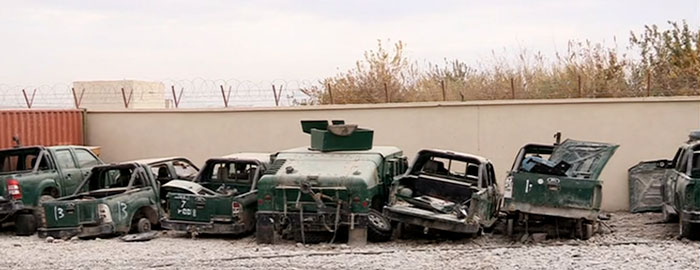
Ben Anderson for his piece for both Panorama and Vice on the drawdown of operations in Helmand Province, Afghanistan – This is what winning looks like and Mission Accomplished: Secrets of Helmand. (VICE/BBC News)
A journalist and writer, Ben Anderson regularly reports for the BBC, The Guardian, The Times and Vice. His book about his experiences in the war-torn southern provinces of Afghanistan, No Worse Enemy, was published in March 2012.
The BBC, who funded the work, have said:
“Ben Anderson spent 5 weeks in Sangin, the most violent town in Afghanistan, where 109 British soldiers lost their lives. Working completely alone and regularly patrolling with the Afghan Police, Army and the small teams of US Marines “advising” them. He was in regular gun battles that often lasted for days, in areas of Afghanistan where the Afghan security forces remain weak and the Taliban strong, enjoying the support of the local population. During his time in Sangin, Ben established a close relationship with the US Marine major in charge of advising the Police. The candidness with which he spoke (“try doing that day in and day out, working with child molesters, it wears on you after a while”) led to hostility from the NATO Commanders’ office, the USMC head office and the office of President Karzai himself.”
“Both the USMC and the MOD have denied Ben access to their troops since this film went out. Karzai’s office initially dismissed the allegations against his forces as “lies” until someone actually saw the film, after which they sent a team to investigate. A few months later, 64 Police Commanders were arrested in the area, many of them accused of child abuse. The US Major who Ben filmed is convinced this is as a result of the documentary. Upon seeing the film, former British Ambassador and Special Representative to Afghanistan, Sir Sherard Cowper Coles, told Ben; “You have exposed the lie at the heart of the NATO strategy.”
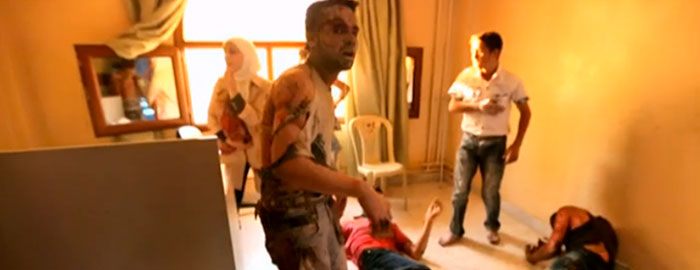
Darren Conway started his career at the BBC in 1994 as a documentary filmmaker in their Hong Kong bureau. Using Asia as a base he has travelled the world covering international news which has brought him the Royal Television Society’s “Cameraman of the Year” award amongst others. Starting out as an unpaid tea-boy at BBC Radio Leicester, Ian Pannell soon moved on to covering foreign affairs. After 9/11 he travelled from New York to Afghanistan where he spent two months living with the Northern Alliance fighters. Since then he has reported from various conflict areas. Of nominating the film, the BBC said:
“Panorama travelled with British doctors inside Syria to exclusively reveal the devastating impact of the war on children caught in the conflict. The doctors witness the aftermath of the bombing of a school by a suspected napalm-like incendiary device and medical facilities constantly under attack – both war crimes under international law. Filmed in the north of the country after the chemical weapons attack in Damascus which inflamed world opinion and brought America, Russia and the UN to the table, the film shows how the conventional war is intensifying with children bearing the brunt of this humanitarian catastrophe.”
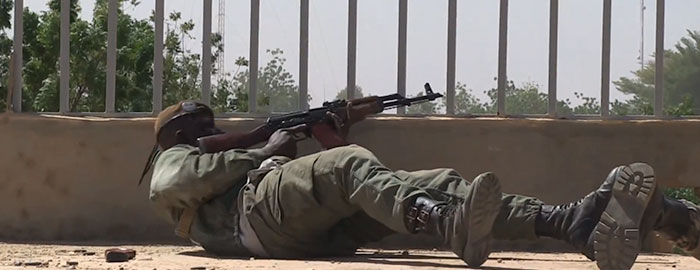
A journalist, filmmaker and staff reporter at Vice, Aris Roussinos is also trained as both an anthropologist and army officer. Over the past two years, he has reported from Libya, Bahrain, Tunisia, Greece, Sudan, Egypt, Syria and Mali. The report was filmed on a self funded month long trip to Mali. Of the report, Vice have said:
“Ground Zero – Mali was shot in Gao, in northern Mali, on February 21, 2013. It was basically the first legitimate combat footage to come out of the war there. Normally the French ban journalists from the front lines and film a sanitised version of the fighting themselves and then distribute it to the media.”
“In this case, the insurgents came to us: They slipped into Gao overnight on small boats and used suicide bombers to blast their way into government buildings. The French left the fighting to the Malian army for most of the day as a test of their combat abilities. Malian soldiers, while very brave, are almost completely untrained and had great difficulty fighting less than a dozen jihadists, some of whom were children. They fired wild bursts of automatic fire everywhere, destroying the city center. The Malians soon ran out of ammunition and had to wait for the French to show up and save the day.”
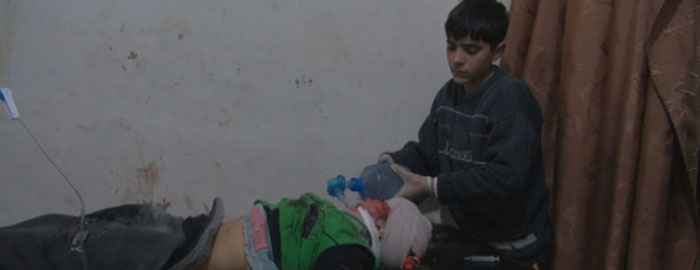
A German photographer and filmmaker who has been reporting from Syria since 2011, he filmed this report on a self funded trip to the city of Aleppo. Of the report, Channel 4 News said:
Two years into Syria’s civil war, Marcel worked with us to make a film about Aleppo that showed what life was like for civilians in the battered city as fighting between rebels and government forces raged around them. The result was a unique portrait of a city in despair – and a devastating watch. Marcel’s photographer’s eye helped him frame beautiful shots of the city, and his observational style of filming showed how people manage to carry on their ordinary lives in extraordinary circumstances.
The film, reported by Jon Snow, led the 7pm Channel 4 News bulletin and the response was immediate and overwhelming. It was subsequently shown on ZDF, ABC, SBS and other broadcasters – and was made into a 30 minute documentary. As a result of the impact of the film, Marcel managed to raise over £150,000 to spend on medical supplies for the Dar Shifa clinic. He took the supplies in with a German NGO on a following trip to Aleppo.
